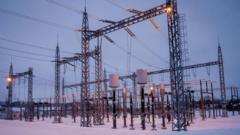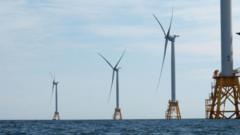The Baltic states of Estonia, Latvia, and Lithuania have officially disconnected from Russia's electricity grid, marking a significant transition to the European Union's power network, a move prompted by security concerns stemming from Russia's actions in Ukraine.
Baltic States Achieve Energy Independence by Joining EU Power Grid

Baltic States Achieve Energy Independence by Joining EU Power Grid
A Historic Shift: Baltic nations move away from Russian energy dependence
The Baltic nations of Estonia, Latvia, and Lithuania have accomplished a historic shift in their energy policy, officially disconnecting from Russia's electricity grid and integrating into the European Union's network. This transition was initiated as a part of a long-term strategy, with plans dating back to 2007, designed to bolster regional security. The urgency for this change intensified after Russia's full-scale invasion of Ukraine in 2022.
EU chief Ursula von der Leyen celebrated the event during a ceremony in Lithuania's capital, declaring, "Today, history is made. This is freedom, freedom from threats, freedom from blackmail." Polish President Andrzej Duda echoed these sentiments, describing the development as a "truly symbolic moment" for the region's security and resilience.
For years, the Baltic states relied on the Brell power grid, which stood for Belarus, Russia, Estonia, Latvia, and Lithuania, connecting them to Moscow's energy supply and presenting a risk of dependence. Despite being NATO members and halting electricity purchases from Russia since 2022, the connection posed ongoing vulnerabilities. Von der Leyen warned of potential Russian retaliation, following recent spy incidents in the Baltic Sea involving damaged subsea cables.
Lithuanian President Gitanas Nauseda pushed for sanctions against Russia's shadow fleet, underscoring the serious nature of the sabotage incidents. Following these tensions, NATO began a new patrol operation named Baltic Sentry, aiming to improve regional security.
Approximately €1.6 billion was invested in this project, with the majority of funding sourced from the EU. The transition unfolded over two days, allowing the Baltic states to function as an "energy island" before fully connecting to the EU grid. Ukrainian Energy Minister German Galushchenko hailed the decision as a pivotal moment for Europe, symbolizing broader efforts to reduce reliance on Russian energy sources amidst ongoing geopolitical conflicts.
EU chief Ursula von der Leyen celebrated the event during a ceremony in Lithuania's capital, declaring, "Today, history is made. This is freedom, freedom from threats, freedom from blackmail." Polish President Andrzej Duda echoed these sentiments, describing the development as a "truly symbolic moment" for the region's security and resilience.
For years, the Baltic states relied on the Brell power grid, which stood for Belarus, Russia, Estonia, Latvia, and Lithuania, connecting them to Moscow's energy supply and presenting a risk of dependence. Despite being NATO members and halting electricity purchases from Russia since 2022, the connection posed ongoing vulnerabilities. Von der Leyen warned of potential Russian retaliation, following recent spy incidents in the Baltic Sea involving damaged subsea cables.
Lithuanian President Gitanas Nauseda pushed for sanctions against Russia's shadow fleet, underscoring the serious nature of the sabotage incidents. Following these tensions, NATO began a new patrol operation named Baltic Sentry, aiming to improve regional security.
Approximately €1.6 billion was invested in this project, with the majority of funding sourced from the EU. The transition unfolded over two days, allowing the Baltic states to function as an "energy island" before fully connecting to the EU grid. Ukrainian Energy Minister German Galushchenko hailed the decision as a pivotal moment for Europe, symbolizing broader efforts to reduce reliance on Russian energy sources amidst ongoing geopolitical conflicts.





















